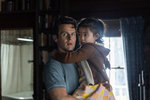Clear, 78°
Wind: mph,



The people at Rotten Tomatoes must be on bath salts, because they’ve rated “Knock at the Cabin” an extremely generous 68 percent. The critics’ consensus declares it “Top Tier Shyamalan.” To be fair to them, “Knock at the Cabin” is peak M. Night Shyamalan, because it contains all his greatest hits: an intriguing (though unoriginal) idea that is heavy handed, badly scripted, poorly acted, terribly directed and ends with a predictable “twist.” Hooray!
The film opens with an obvious metaphor of a little girl named Wen trapping grasshoppers in a glass jar and making them her experimental playthings — she is the god of her own little grasshopper globe. They are subject to her every whim, just as humans are to the whims of the supernatural. So deep!
She is confronted by Leonard, a burly man who tries to befriend her and her “two dads.” Leonard and his friends (there are four friends in total) explain to Wen and her parents, Eric and Andrew, that the family must choose one member to die as a “sacrifice,” or the world will end (oh look, is it … the trolley problem? Wow, M. Night has never explored that theme before).
If the family does not choose or make the sacrifice, each of the four friends must die in succession, and each of their deaths will bring destruction, death and calamity to the Earth. Could these four friends be … the four horsemen of the apocalypse? Oh sorry, that was the twist at the end. I’d apologize for spoiling it if it wasn’t completely obvious from the first five minutes — hardly a spoiler unless you’ve lived under a rock your entire life. Eric and Andrew, of course, do not believe their captors and think the four friends are having a psychotic episode or are members of a religious doomsday cult.
Right away, we are presented with the classic Shyamalan archetypes, seven characters who all represent something different about humanity — and we know this, because they tell us. I think Shyamalan needs to go back to film school and learn what “exposition” is. He has a compulsive need to spell out everything in black and white immediately, and he is utterly incapable of telling stories through demonstration.
The metaphors are as heavy handed as the axes they kill each other with (again, not a spoiler because this happens within the first 10 minutes). I was ready to sacrifice myself by the second half. I can’t even decide if the acting is bad, or if the actors have so little to work with that not even Meryl Streep could make it watchable. John Bautista tries and shows decent range, but Rupert Grint is cringeworthy. He’s terrible for his 2.5 minutes of screentime — he cannot hide his English accent at all. Call it a reverse Keanu Reeves!
The only parts that aren’t torture to watch are flashbacks of Eric and Andrew adopting and raising Wen, because it’s our only peek at scenes that resemble anything vaguely human. Honestly, has Shyamalan ever even met a real human being? Maybe this film was entirely made by artificial intelligence — that would be very 2023.
I wanted to give the director credit for one thing and one thing only: much like in Shyamalan’s last film, “Old,” the premise of “Knock at the Cabin” is a good one — even if the concept has been covered already (see “10 Cloverfield Lane” or certain episodes of “The Twilight Zone”). I was going to say, classic Shyamalan — interesting idea, poor execution. But the idea is not even his. I have come to discover (much like with “Old”) that the film is an adaptation of far more powerful source material.
In Paul Tremblay’s novel “The Cabin at the End of the World,” Eric and Andrew attempt to regain agency over the situation by reaching for a hidden gun, but they accidentally shoot their own daughter in the process. This wasn’t intentional, so the death doesn’t count as a sacrifice and now either Eric or Andrew must die. Their captors feel doubt about their choice after this event. In the end, Eric and Andrew decide that if God is real, he’s a cruel god for finding the loss of their beautiful daughter and all the suffering they’ve been through as gay men to not be enough.
The couple refuses to choose. They spite God, they accept their fate and they usher in the apocalypse — maybe. You never find out if the whole thing was real or not. It’s a powerful story about agency, tragedy, fate and death — a true Stoic parable.
In Shyamalan’s clumsy hands, the fact the apocalypse is real is evident early. There’s never any doubt in the end about whether the right choice was made, from either the captors or the family. His arrogance transforms a poignant fable into a muddled allegory about the power of love and sacrifice or something, and wow, the gay family is the purest and chosen by God. How beautiful! His self-important need to shove everything into his signature “twist” format takes precedence over respect for his source material. He thinks he’s so deep, and he has to tell everyone, but I think we have a serious case of the Dunning-Kruger effect on our hands.
It’s true that the dialogue for the first 75% of the story is directly lifted from the book, but a more capable director (and writer, and producer) could have tweaked the dialogue and exposition and brought out the spirit of the story in a convincing way. Shyamalan has managed to lazily ignore proper translation of the written word to the silver screen for less important scenes, while completely overhauling the important bits that made the novel worth reading. He should give Jordan Peele a call next time — and maybe some other people too. Maybe one person shouldn’t fill all three of those roles unless they’re exceptional. His continued insistence to be in control of all aspects of his projects smacks of narcissism.
In the end, Shyamalan can’t execute good ideas properly, even when they are his own. He’s like George Lucas’ more pathetic cousin — he did one thing right, and ever since then has been getting in his own way. He says he makes films that push boundaries, but the only boundaries he pushes are my patience. I’ve informed my editor that if he sends me to another M. Night Shyamalan film, it’s going to cost him double.
Comments
No comments on this item Please log in to comment by clicking here